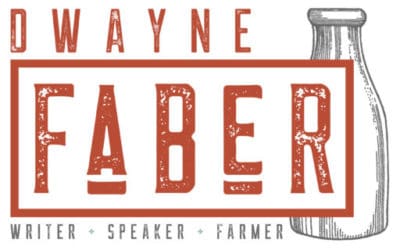There are moments where any parent feels they have failed as a parent. There was that time my 8-year-old asked if she could put ketchup on a perfectly prepared prime rib that came right from the Traeger Grill. There was that time my kids said they were bored on our family vacation as we traveled rural Michigan to look at dairy farms and what crops were being grown. Then, there was that time my daughter asked me why eating beef is bad for the environment. To be clear, we are dairy farmers, we eat cows, sometimes with ketchup. After some further investigation it came out that she heard this from watching TV. There are lines being drawn in the world and it is becoming increasingly clear that you and I are on the wrong side of it. Who is behind this? Why?
This past January, there was an annual meeting for the World Economic Forum (WEF) in Davos, Switzerland. This is not your average meetup of Learjet flying-social elites who are concerned about what light bulbs people use, how many times you eat steak or how big your carbon footprint is on the drive to work. As you join me on this journey, Mrs. Faber thinks it’s important to stick to facts and that you, dear reader, and myself do not delve into crazy town. It is easy to go to crazy town. You don’t get invited back to Christmas or Thanksgiving if you live in crazy town.
The WEF is an organization based out of Switzerland and run by a German of the name Klaus Schwab. The WEF brings together individuals, business leaders and politicians to discuss issues that affect the global economy. While some of their goals are genuinely altruistic and seemingly for the good of society, others take on a darker tone. They achieved some internet notoriety with their first vision that people will “own nothing, and be happy.” This desire is that corporations or governments control every aspect of a citizen’s life. It feels a little dystopian to write about, and yet these ideas are being put out into the public, most notably by the book entitled “COVID-19: The Great Reset” by Schwab himself. A scarier idea being fostered in the ivory towers is the belief that humans are the virus on the planet, and many of the world’s problems would be reduced if there were fewer people. Jane Goodall said in 2020 at the WEF, “Many of the world’s environmental problems would be relieved if the population was that of 500 years ago.”
The work that you and I do is of great interest to the WEF as they seek to define the narrative on what is sustainability. For the uninitiated, the person who controls the definition, controls the argument. Mr. Schwab has stated that meat consumption should be a treat enjoyed on occasion and not daily. Never fear, his substitute is, drum roll please, crickets. Literally, crickets. The largest think tank in the world has utopian visions of humanity going to vegan BBQs where you brag about your perfectly seared cauliflower and toasted crickets.
The WEF has also declared war on farming and animal agriculture, and countries are listening. This past year, Dutch dairy farmers were told by the European Union that they needed to reduce nitrogen levels in their soil by 90%. These strict reductions are unlikely to be met, and billions of dollars are being set aside to buy out hundreds of Dutch dairy farmers. The thought of being forced out of business by onerous environmental demands have resulted in several large-scale protests where farmers are snarling up traffic and burning hay bales. You know farmers are upset when they burn good feed. These ideas are spreading, and similar protests are happening in New Zealand, Spain and Ireland. There are probably no better people to stand up to large-scale government regulation than the Dutch. Mrs. Faber has said that the Dutch are known for being outspoken, blunt, stubborn and difficult. She knows this because she lives with one. Historically, the Dutch have been known to physically throw out their politicians and, in one instance, engage in cannibalism. True reference; look up Johan de Witt.
It is important for us to be informed about who is on the other side, and who is lobbing grenades in our direction. We also need to be proactive about controlling the definitions of words, as that controls the argument. We need to continue to work to get better in everything that we do on the farm. We have a social license to operate, and that means having a healthy, symbiotic relationship with our animals, our soil and our employees. There will be increased scrutiny on animal agriculture, nitrogen output and fertilizer usage, but the fight is worth it. Feeding people and sustaining life is worth it. And, if little girls want to put some ketchup on their prime rib, I think I’ll be OK with it.
